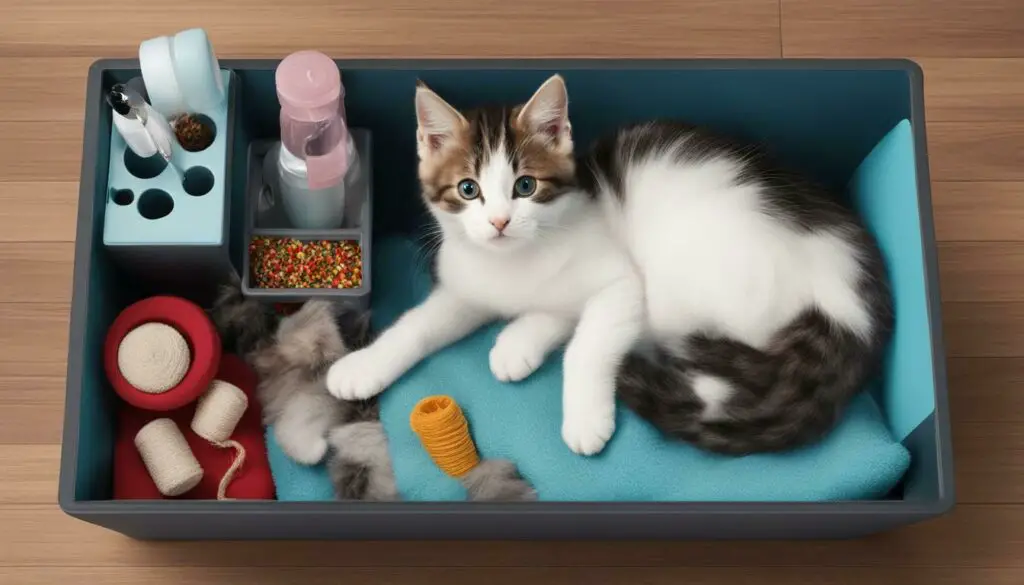Bringing home a new kitten is an exciting time, but it’s crucial to be prepared with all the essential items to provide them with a comfortable and safe environment.
Key Takeaways:
- Make sure to have all the necessary supplies ready before bringing home your new kitten.
- Kitten-proof your home by securing windows, removing fall risks, and keeping harmful items out of reach.
- Provide a suitable sleeping area for your new kitten, ensuring it’s cozy and comfortable.
- Invest in high-quality cat products to ensure your kitten’s comfort and safety.
- Schedule a vet visit, get your kitten vaccinated, microchipped, and start parasite prevention.
Preparing Your Home for a New Kitten
Before bringing your new kitten home, it’s important to take precautions and make your home a safe space for them to explore. Kittens are naturally curious and love to explore their surroundings, so it’s essential to kitten-proof your home to prevent any accidents or injuries. Here are some necessary items and steps to consider when preparing your home for your new furry friend:
- Secure windows: Ensure that all windows are securely closed or have screens installed to prevent your kitten from escaping or falling out.
- Remove fall risks: Kittens are known for their climbing abilities, so remove any objects that they could potentially climb on and fall from, such as unstable furniture or shelves.
- Pick up cords: Keep electrical cords and wires out of your kitten’s reach to prevent them from chewing on them and getting injured or causing damage.
- Make houseplants and bouquets inaccessible: Many common houseplants are toxic to cats, so place them in areas that your kitten can’t access. The same goes for bouquets, as some flowers can be harmful if ingested.
- Keep food and medications locked away: Store all human food, medications, and household chemicals in secure cabinets or containers to prevent accidental ingestion by your kitten.
By taking these precautions and making your home kitten-proof, you can create a safe environment for your new furry friend to explore and play in. It’s vital to remember that kittens are curious and can get into trouble easily, so it’s always better to err on the side of caution when it comes to their safety.
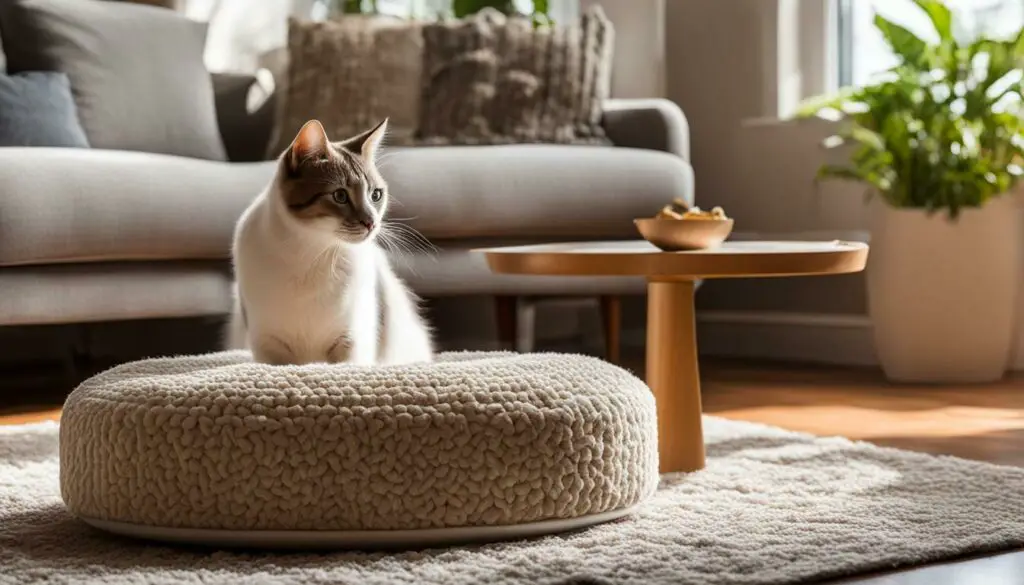
“Kittens are curious and love to explore their surroundings, so it’s essential to kitten-proof your home to prevent any accidents or injuries.”
Choosing the Right Kitten Food and Water Bowls
Providing your new kitten with the right food and water bowls is essential for their health and well-being. As a responsible pet owner, it is important to choose bowls that are practical, safe, and suitable for your kitten’s needs.
When selecting food and water bowls, opt for ones that are made of durable and non-toxic materials, such as stainless steel or ceramic. These materials are easy to clean, resistant to scratches, and do not harbor bacteria like plastic bowls can. Additionally, stainless steel and ceramic bowls are less likely to cause allergies or skin irritations in sensitive kittens.
To encourage healthy eating habits, consider using shallow or wide bowls that allow easy access to food. This helps prevent whisker stress, a condition where a cat’s sensitive whiskers get irritated by touching the sides of a deep bowl. Remember to choose bowls that are appropriate for your kitten’s size, ensuring they have plenty of space to comfortably eat and drink.
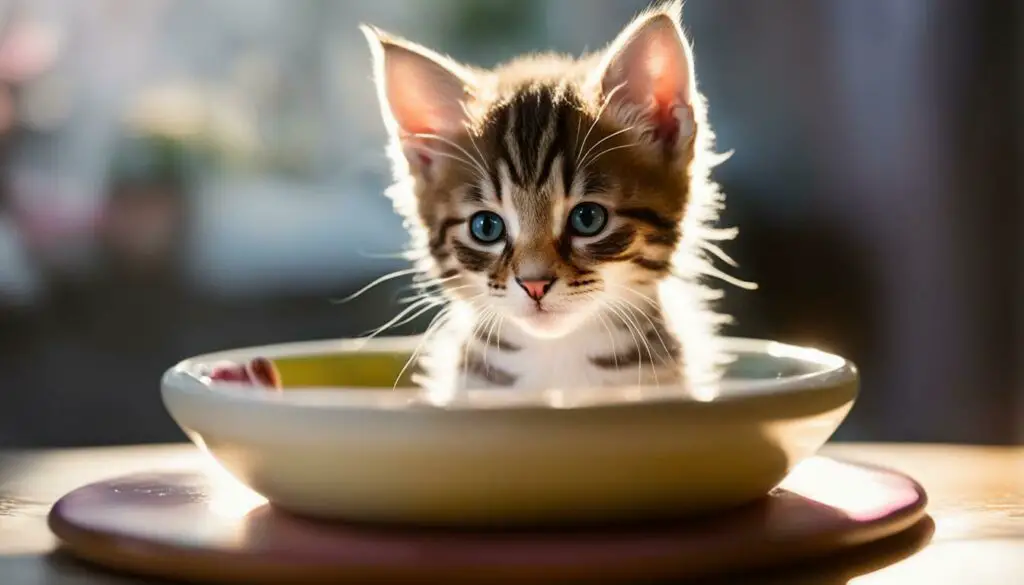
It’s important to regularly wash and sanitize your kitten’s food and water bowls to prevent bacteria growth. Clean the bowls daily using hot soapy water and rinse thoroughly. Avoid using harsh chemicals or abrasive scrubbers that may damage the bowls.
By selecting the right food and water bowls for your new kitten, you are taking an important step towards their overall health and happiness. Remember, a well-fed and hydrated kitten is a happy and thriving one.
| Benefits of Choosing the Right Bowls |
|---|
| Hygiene: Stainless steel and ceramic bowls are easy to clean and do not harbor bacteria like plastic bowls. |
| Safety: Non-toxic materials prevent allergies and skin irritations in sensitive kittens. |
| Comfort: Shallow or wide bowls prevent whisker stress and provide ample space for eating and drinking. |
Investing in quality food and water bowls is a small but important part of caring for your new kitten. It ensures they have a pleasant dining experience and helps maintain their overall health and well-being. So, when preparing for your new furry friend, don’t forget to add food and water bowls to your essential kitten care supplies checklist.
Setting Up a Comfortable Sleeping Area
Ensuring your new kitten has a comfortable place to sleep is crucial for their overall happiness and relaxation. Just like humans, kittens need a cozy and secure spot to rest and recharge. When setting up a sleeping area for your new furry friend, consider the following necessary items:
- Kitten Bed: Invest in a soft and cushioned bed specifically designed for kittens. Look for a bed with washable covers for easy maintenance.
- Blankets: Provide your kitten with warm and snuggly blankets to keep them cozy during naptime. Opt for materials that are safe and easy to clean.
- Heating Pad: If you live in a colder climate or your kitten tends to get chilly, consider using a heating pad designed for pets. Make sure to choose a pad with adjustable temperature settings and one that is safe for kittens.
Creating a peaceful sleeping environment is essential for your new kitten’s well-being. Place their sleeping area in a quiet and low-traffic part of your home, away from distractions and noise. Kittens are naturally curious, so ensure their sleeping space is secure and free from any potential hazards.
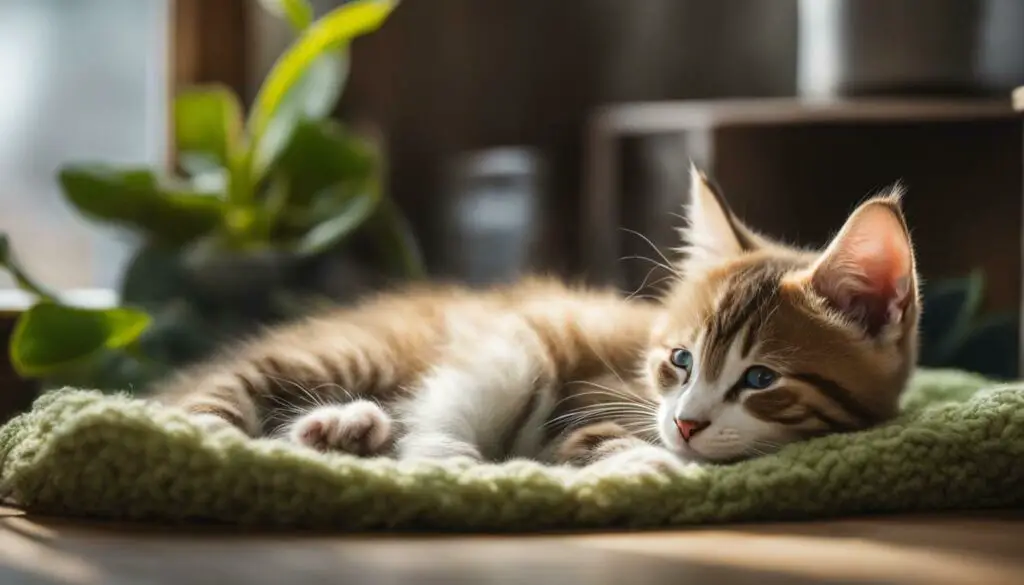
Remember, kittens need plenty of sleep to grow and develop properly. Providing a comfortable sleeping area is a must to ensure they get the rest they need. Take the time to set up a cozy and inviting space, and your new kitten will thank you with purrs and cuddles.
| Kitten Bed | Blankets | Heating Pad |
|---|---|---|
| Soft and cushioned bed | Warm and snuggly blankets | Adjustable temperature settings |
| Washable covers | Safe and easy to clean materials | Safe for kittens |
Quote:
“A comfortable sleeping area is the key to a happy and well-rested kitten.”
The Importance of a Proper Litter Box
A proper litter box is an essential item for your new kitten’s well-being and successful litter training. Providing a comfortable and suitable litter box not only promotes good hygiene but also helps prevent behavioral problems. Here are some key factors to consider when choosing a litter box for your new furry friend.
- Size: The litter box should be large enough for your kitten to move around comfortably. A general rule of thumb is to choose a litter box that is 1 ½ times the length of your kitten from nose to tail.
- Accessibility: Opt for a litter box with low sides or a ramp for easy entry and exit, especially for young kittens or older cats with mobility issues.
- Multiple Boxes: If you have more than one cat, it’s crucial to have multiple litter boxes in different locations to avoid territorial issues and provide ample options for your cats.
- Litter Type: Experiment with different types of litter to find the one that your kitten prefers. Some kittens may have a preference for clumping litter, while others may prefer non-clumping or natural options. Consider the texture and smell of the litter as well.
- Covered or Uncovered: Some cats prefer privacy and may feel more comfortable using a covered litter box, while others may prefer an open one. Experiment with both options to see which one your kitten prefers.
Remember to clean the litter box regularly to maintain hygiene and prevent odors. Scoop the litter box at least once a day, and completely change the litter and clean the box every week. By providing a proper litter box and ensuring its cleanliness, you can help your new kitten develop good litter box habits and prevent any potential litter box issues.
Table 1: Pros and Cons of Covered and Uncovered Litter Boxes
| Pros of Covered Litter Boxes | Cons of Covered Litter Boxes |
|---|---|
| Provides privacy | May trap odors |
| Contains litter scatter | May feel confined or trapped |
| Reduces visibility of waste | May be challenging to clean |
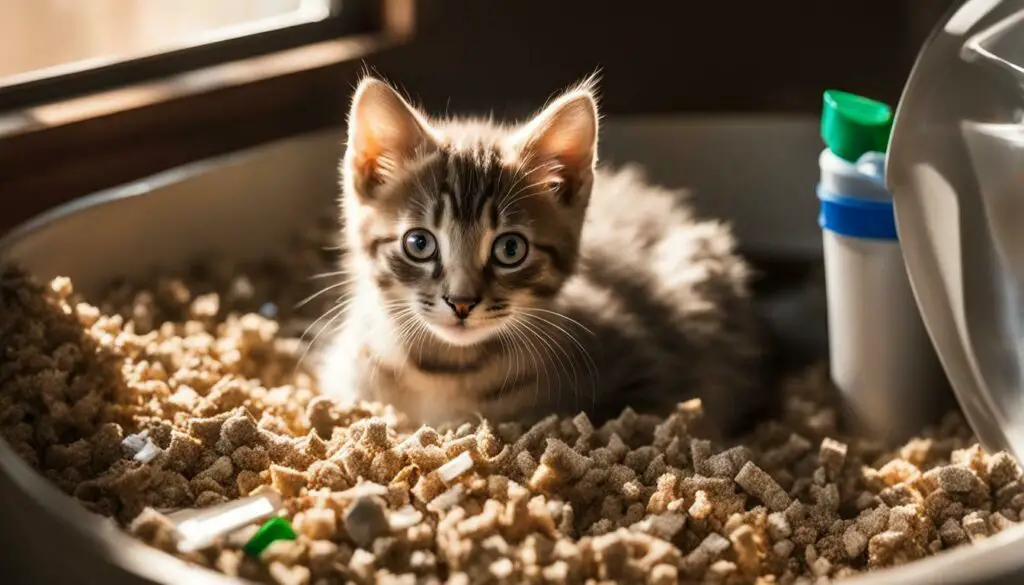
With a proper litter box, you can ensure your new kitten’s comfort and instill good litter box habits from the start. Remember to provide a clean and inviting litter box, and monitor your kitten’s behavior to address any potential issues promptly. A well-maintained litter box will contribute to a happy and healthy environment for both you and your furry friend.
Toys and Entertainment for Your New Kitten
Toys and entertainment play a crucial role in keeping your new kitten active, happy, and entertained. As a responsible pet owner, it’s important to provide your furry friend with a variety of toys that cater to their natural instincts and interests. Here are some essential items to consider for your new kitten’s playtime:
- Interactive toys: These toys engage your kitten’s curiosity and stimulate their mind. Puzzle toys, treat-dispensing toys, and toys with hidden surprises are great options to keep your kitten entertained and mentally sharp.
- Feather toys: Kittens are instinctively drawn to feathers, making feather toys a popular choice. The movement and texture of feathers mimic the prey they would naturally chase, ensuring hours of playful fun.
- Balls and mice: Lightweight balls and small mouse toys are classic choices for kittens. These toys allow your furry friend to chase, pounce, and bat around, keeping them active and engaged.
- Teething toys: Just like human babies, kittens go through a teething phase. Providing them with appropriate teething toys not only soothes their gums but also helps redirect their biting behavior away from your hands and furniture.
Remember to rotate your kitten’s toys regularly to prevent boredom and maintain their interest. Additionally, always supervise playtime to ensure your kitten’s safety and prevent them from ingesting any small parts. A safe and stimulating environment, combined with the right toys, will keep your new kitten happily entertained.
“Playtime with my kitten is always a joyous occasion! Watching her chase after a feather toy or bat around a ball brings a big smile to my face. It’s not just fun for her, but it also helps strengthen our bond. Investing in a variety of toys has truly made a difference in keeping her active, happy, and content.”
As a kitten owner, it’s crucial to understand that playtime is not just about having fun. It also serves as an outlet for your kitten’s natural instincts and energy. By providing the right toys and entertainment, you can promote their physical, mental, and emotional well-being. So, get ready for endless hours of playtime and cherished memories with your new furry friend.

| Benefits of Toys and Entertainment for Your New Kitten |
|---|
| Keeps them active and physically fit |
| Stimulates their mind and prevents boredom |
| Helps develop coordination and agility |
| Redirects their biting and scratching behavior |
| Strengthens the bond between you and your kitten |
Scratching Surfaces: Protecting Your Furniture
Investing in scratching surfaces is essential to protect your furniture and encourage your new kitten’s natural scratching instincts. Kittens have a natural urge to scratch, which helps them stretch their muscles, sharpen their claws, and mark their territory. By providing appropriate scratching surfaces, you can redirect their behavior away from your precious furniture.
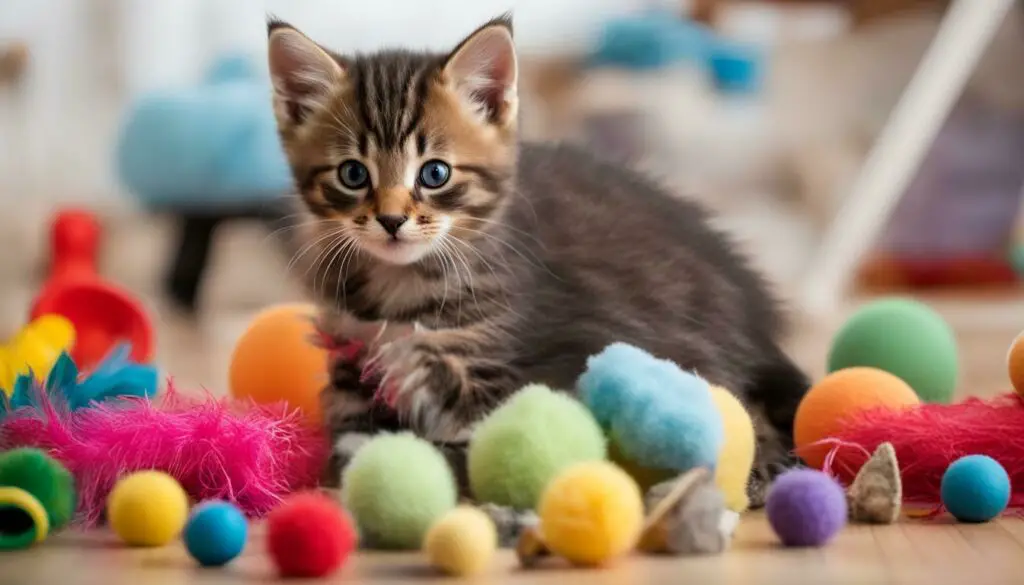
There are various types of scratching surfaces available, ranging from vertical scratching posts to horizontal cardboard scratchers. It’s important to choose a surface that your kitten will find appealing. Some kittens prefer sisal rope or carpeted posts, while others enjoy corrugated cardboard surfaces. You may need to try different options to find the one that your kitten prefers.
Place the scratching surface in a central location where your kitten spends most of their time. Encourage them to use it by gently guiding their paws and rewarding them with treats or praise when they scratch the designated surface. Avoid punishing or scolding your kitten for scratching furniture, as this can create anxiety and confusion.
| Benefits of Scratching Surfaces | Types of Scratching Surfaces |
|---|---|
|
|
Remember to regularly trim your kitten’s claws to prevent them from becoming too sharp. If your kitten continues to show a preference for scratching furniture despite having appropriate scratching surfaces, consider using a cat-friendly deterrent spray or double-sided tape on the furniture to discourage them. With time, patience, and the right scratching surfaces, you can protect your furniture and provide your new kitten with a fulfilling scratching experience.
Getting the Right Carrier for Your Kitten
A proper carrier is essential for safely transporting your new kitten and ensuring stress-free visits to the veterinarian. When choosing a carrier, consider the size and comfort of your kitten. Opt for a carrier that provides enough space for your kitten to stand, turn around, and lie down comfortably. Additionally, look for carriers that are well-ventilated to ensure proper airflow and reduce anxiety during travel.
To make the carrier more inviting for your kitten, line it with a soft blanket or towel. This will provide them with a cozy and familiar space, helping to alleviate stress. It’s also a good idea to place a few of their favorite toys or a small treat inside the carrier to create a positive association.
As your kitten grows, you may need to upgrade to a larger carrier. It’s important to regularly check the carrier for any signs of wear and tear and replace it if necessary. A sturdy and secure carrier is crucial for the safety of your kitten during transportation.
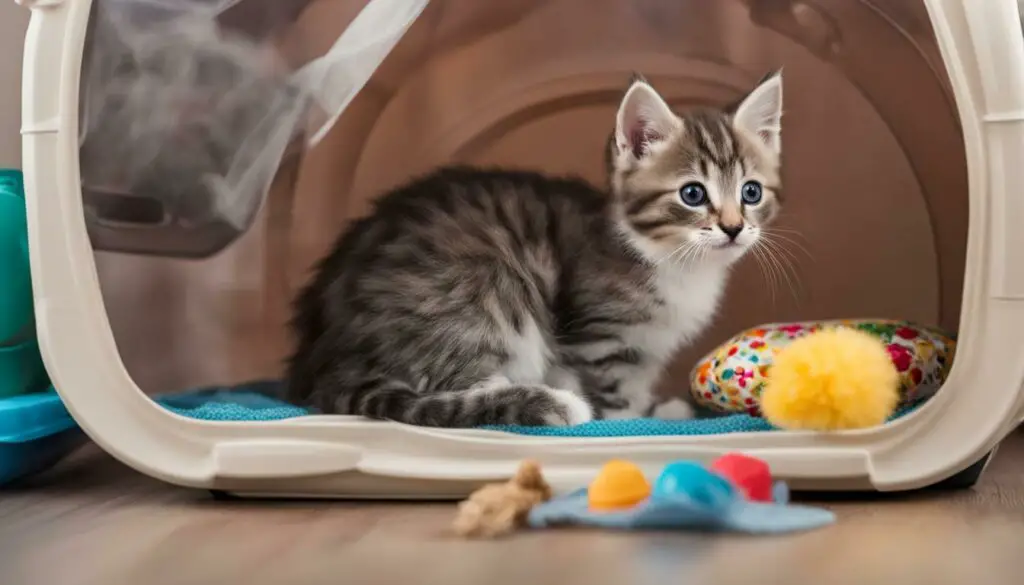
Remember, getting the right carrier is just one item on the new kitten checklist. Be sure to have all the necessary supplies ready to provide a comfortable and safe environment for your furry friend. By preparing in advance, you can ensure a smooth transition and a happy and healthy start for your new kitten.
Scheduling a Vet Visit for Your New Kitten
It’s crucial to schedule a vet visit shortly after bringing your new kitten home to establish their health baseline and address any potential issues. A thorough examination by a veterinarian will help ensure that your furry friend is healthy and free from any underlying conditions. During the visit, the vet will check your kitten’s overall health, perform necessary vaccinations, conduct tests for common feline diseases, and provide guidance on parasite prevention.
As a responsible pet owner, it’s important to remember that kittens require a series of vaccinations to protect them against diseases such as feline distemper and respiratory infections. The veterinarian will provide you with a vaccination schedule tailored to your kitten’s age and health condition. It’s crucial to follow this schedule to ensure your kitten receives the necessary protection.
Additionally, the vet visit is an ideal time to discuss any concerns or questions you may have about your new kitten’s diet, behavior, and overall care. The veterinarian can provide valuable advice on nutrition, litter training, and socialization to help you provide the best possible care for your furry companion.
Remember, early veterinary care is essential in preventing and detecting any health issues that may arise. By scheduling a vet visit for your new kitten, you are taking proactive steps towards ensuring their well-being and setting them up for a happy and healthy life.
| Reasons to Schedule a Vet Visit for Your Kitten | Importance |
|---|---|
| Establishing a health baseline | Vets can assess your kitten’s overall health and detect any potential issues early on. |
| Vaccinations | Kittens need a series of vaccinations to protect them against common diseases. |
| Disease testing | Vets can conduct tests to ensure your kitten is free from transmissible diseases. |
| Parasite prevention | Veterinarians can provide guidance on preventing parasites such as fleas and ticks. |
| Expert advice | Vets can answer questions and provide guidance on kitten care, nutrition, and behavior. |
Insert the image here: 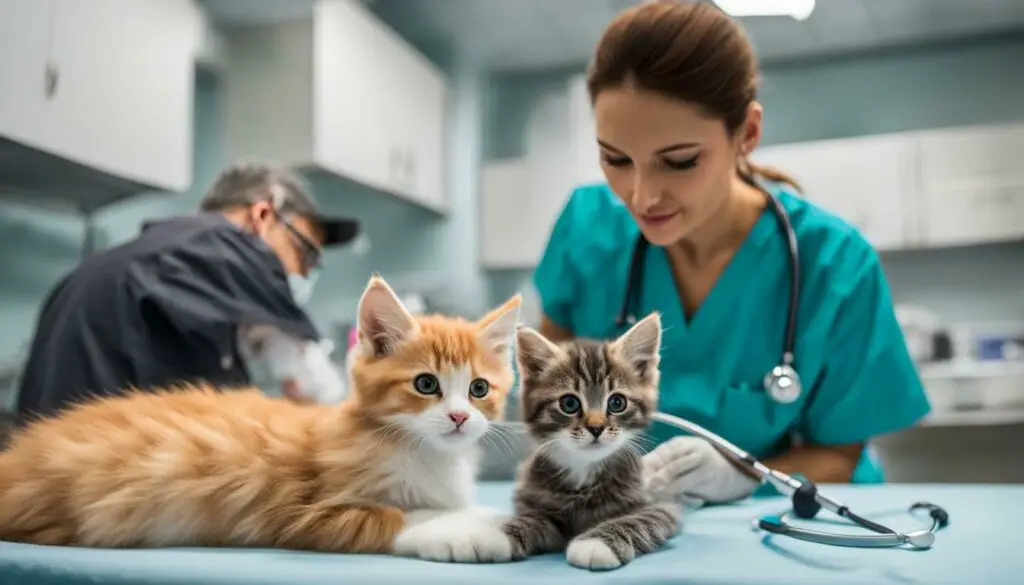
“Regular veterinary care is essential for the overall well-being of your new kitten. By scheduling a vet visit shortly after bringing them home, you are taking the necessary steps to ensure their health and happiness.” – Dr. Sarah Johnson, DVM
Microchipping and Identification for Your Kitten
Microchipping your new kitten is a crucial step to ensure their identification and increase the chances of a safe return if they ever get lost. A microchip is a tiny electronic device, about the size of a grain of rice, that is implanted under your kitten’s skin. It contains a unique identification number that can be read by a microchip scanner. This number is registered with a national database, which holds your contact information. If your kitten is found by a shelter, veterinarian, or animal control, they can scan the microchip and contact you to reunite you with your little one.
Having your kitten microchipped is a simple and relatively painless procedure. It can be done by a veterinarian during a regular visit or even at a local animal shelter. The microchip is inserted using a needle, similar to a vaccination. Your kitten may experience a brief moment of discomfort, but it is quickly forgotten. It’s important to register your contact information with the microchip company and keep it updated if you move or change phone numbers.
Remember, a microchip is a permanent form of identification for your kitten. Unlike collars or tags, it cannot be lost or removed. It provides peace of mind, knowing that if your beloved pet ever goes missing, their microchip will give them the best chance of being returned to you. So, make sure to add microchipping to your kitten supplies checklist and take this important step in preparing for a new kitten.
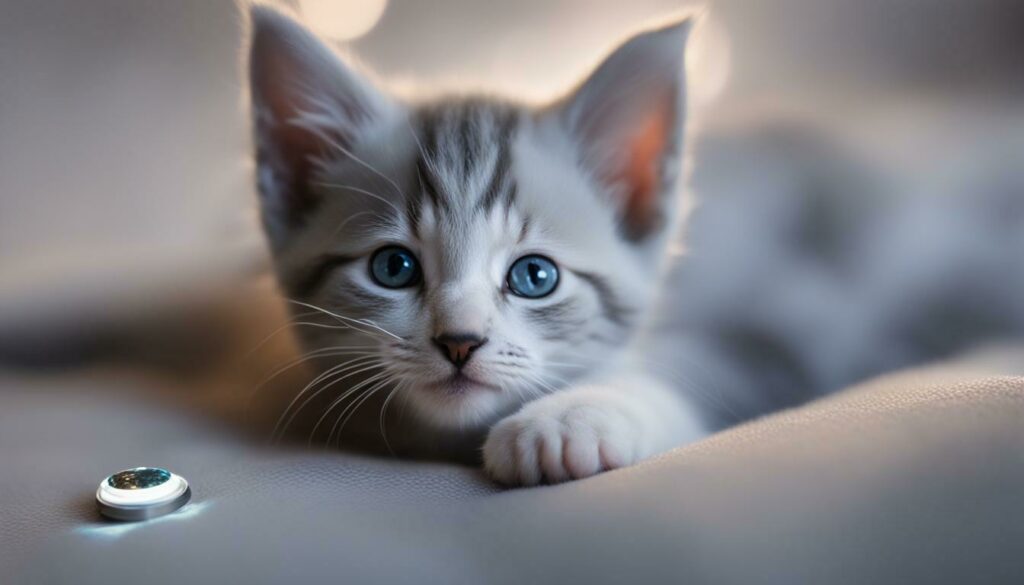
| Advantages of Microchipping Your Kitten |
|---|
| Permanent identification |
| Increases chances of safe return if lost |
| Quick and painless procedure |
| Registered contact information for easy identification |
| Does not require regular maintenance like collars or tags |
Vaccinations and Disease Testing
Vaccinating your new kitten and testing for diseases is vital to protect their health and prevent the spread of contagious illnesses. It’s important to consult with your veterinarian to determine the appropriate vaccination schedule for your kitten. Vaccines help stimulate the immune system and provide protection against common feline diseases such as feline panleukopenia, calicivirus, and rhinotracheitis.
Disease testing is also crucial to ensure your kitten is healthy and doesn’t pose a risk to other pets. Common tests include feline leukemia virus (FeLV) and feline immunodeficiency virus (FIV) screening. These viral infections can weaken the immune system, making the kitten more susceptible to other diseases.
| Vaccinations | Disease Testing |
|---|---|
|
|
Vaccinating your new kitten not only protects them but also contributes to the overall health and well-being of the feline population,” says Dr. Emily Thompson, a veterinarian with 10 years of experience. “It’s important to follow the recommended vaccination schedule and keep your kitten up-to-date on their shots to ensure long-term protection against preventable diseases.”
Remember, prevention is key when it comes to your kitten’s health. By vaccinating your new kitten and conducting disease testing, you are taking important steps to safeguard their well-being and provide them with the best start in life.
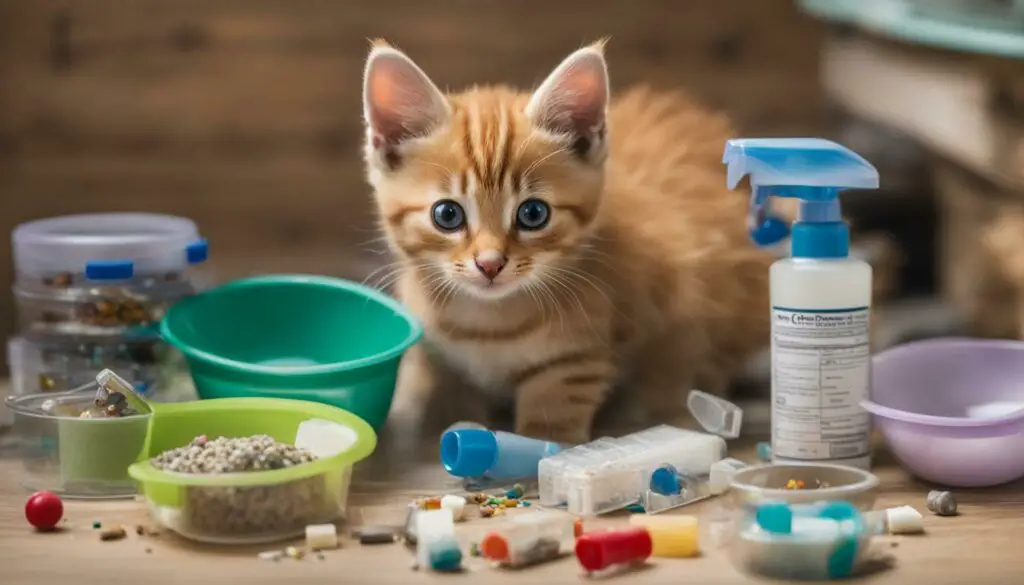
Parasite Prevention for Your New Kitten
Protecting your new kitten from parasites is crucial for their health and overall quality of life. Kittens are particularly vulnerable to parasites due to their developing immune systems. Preventing parasites not only helps keep your kitten healthy but also ensures the well-being of your entire household. Here are some necessary items and steps to take when getting ready for a new kitten.
1. Flea and Tick Prevention
Fleas and ticks can cause discomfort, skin irritation, and transmit diseases to your kitten. To prevent infestations, it’s important to use appropriate flea and tick treatments recommended by your veterinarian. These treatments can be in the form of topical solutions, collars, or oral medications. Regularly inspect your kitten’s fur for signs of fleas or ticks, especially after outdoor activities.
2. Heartworm Prevention
Heartworm disease is a serious and potentially fatal condition in cats, transmitted through mosquito bites. Preventive measures such as monthly heartworm preventives are essential to safeguard your new kitten’s health. Consult your veterinarian to determine the most suitable heartworm prevention medication for your kitten based on their age, weight, and lifestyle.
3. Intestinal Parasite Prevention
Kittens are susceptible to intestinal parasites like roundworms, hookworms, and tapeworms. These parasites can lead to poor growth, anemia, and gastrointestinal issues. Deworming medications are necessary to eliminate and prevent intestinal parasites. Your veterinarian may recommend regular deworming as part of your kitten’s preventive care routine.
In addition to deworming, practicing good hygiene is crucial. Clean and sanitize the litter box regularly to prevent parasite contamination. Wash your hands thoroughly after handling your kitten or cleaning up their waste.
By following these necessary parasite prevention measures, you can ensure your new kitten starts their life in a safe and healthy environment. Remember to consult your veterinarian for guidance on the appropriate parasite prevention products and schedule regular check-ups to monitor your kitten’s health.
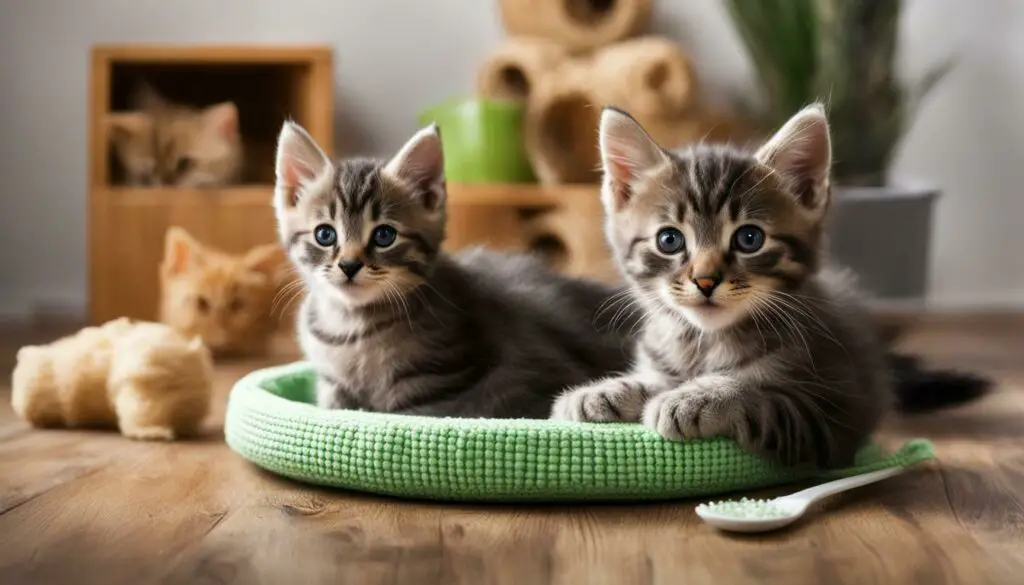
Investing in Quality Cat Products
Providing your new kitten with high-quality cat products is essential to meet their needs and ensure their overall well-being. As a responsible pet owner, it’s important to choose products that are safe, durable, and designed specifically for kittens. Here are some must-have kitten care supplies that you should consider:
- Kitten Food: Opt for a high-quality, age-appropriate kitten food that provides the essential nutrients for their growth and development. Look for products that are formulated with real meat and do not contain artificial additives or fillers.
- Food and Water Bowls: Choose sturdy, non-toxic bowls that are easy to clean and big enough to accommodate your kitten’s growing appetite. Stainless steel or ceramic bowls are recommended as they are resistant to scratching and won’t harbor bacteria like plastic bowls do.
- Litter Box: Invest in a litter box that is spacious, easy to clean, and has low sides for easy access. Consider getting a litter box with a hood or high sides if your kitten tends to kick litter outside the box.
- Toys: Kittens are playful creatures and need plenty of toys to keep them entertained and prevent boredom. Look for toys that are safe, durable, and provide mental and physical stimulation. Interactive toys, such as puzzle feeders and feather wands, are great for engaging your kitten’s natural instincts.
Along with these essential items, it’s also important to consider other cat products such as scratching posts, comfortable bedding, grooming tools, and a carrier for safe transportation. Remember, investing in high-quality cat products will not only ensure your new kitten’s comfort and happiness but also contribute to their long-term health and well-being.
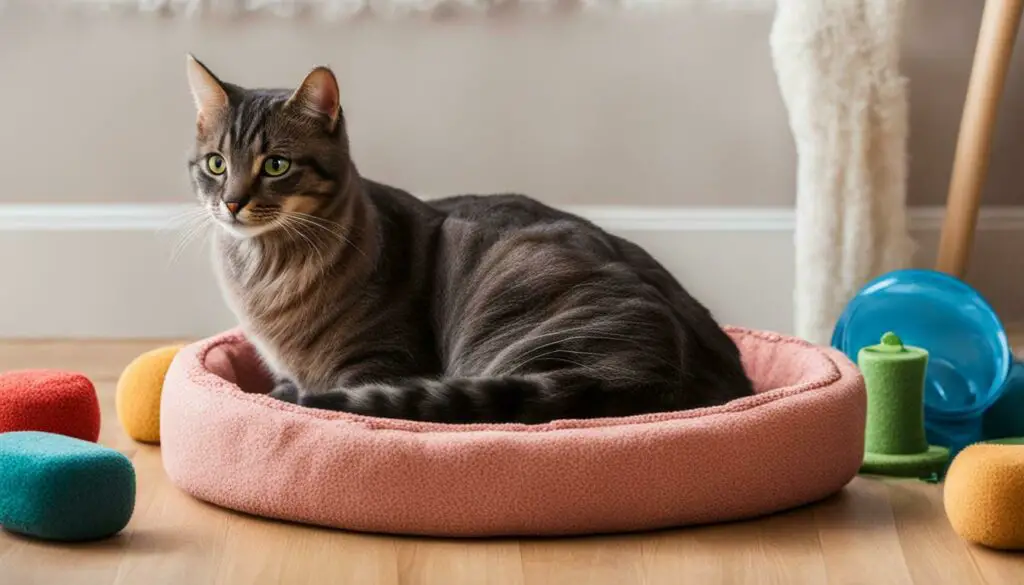
Table: Recommended Brands for Kitten Care Supplies
| Category | Recommended Brands |
|---|---|
| Kitten Food | Blue Buffalo, Royal Canin, Hill’s Science Diet |
| Food and Water Bowls | Stainless Steel: Loving Pets, Dr. Catsby; Ceramic: Ethical Pet, Catit |
| Litter Box | Litter-Robot, Nature’s Miracle, Catit |
| Toys | KONG, Petstages, Cat Dancer |
Remember, each kitten is unique, and it may take some trial and error to find the products that work best for your furry friend. Prioritize their safety, comfort, and enjoyment when choosing cat products, and always consult with your veterinarian for specific recommendations based on your kitten’s individual needs.
Finding a Trusted Vet for Your Kitten
Finding a trusted and reliable veterinarian is crucial for the long-term health and well-being of your new kitten. As a responsible pet owner, it’s important to establish a relationship with a vet who can provide the best care and guidance for your furry friend.
When searching for a vet, consider recommendations from friends, family, or fellow pet owners. You can also check online reviews and ratings to get an idea of their reputation and quality of service. It’s essential to find a vet who specializes in feline care and has experience with kittens.
During your first visit, observe how the vet interacts with your kitten. A knowledgeable and compassionate vet will take the time to answer your questions, address any concerns, and make your kitten feel comfortable. They should also explain preventive care measures, such as vaccinations, spaying or neutering, and dental care.
Remember, building a strong relationship with your vet is an ongoing process. Regular check-ups, open communication, and trust are key factors in ensuring your new kitten receives the best possible care. So take the time to find a vet who not only meets your expectations but also genuinely cares for the well-being of your furry companion.
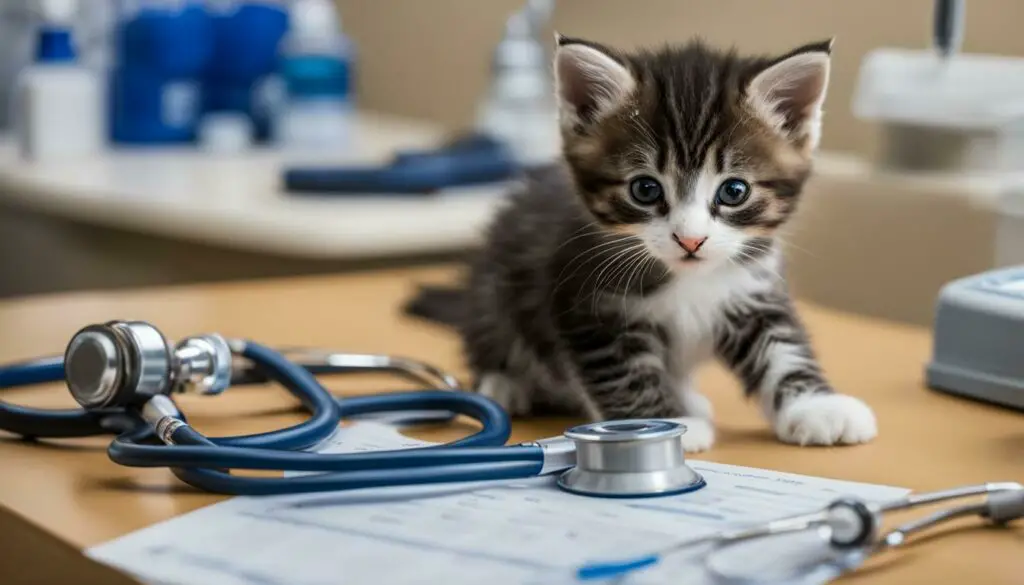
| Key Considerations | Questions to Ask |
|---|---|
| Specialization in feline care | Do you have experience with kittens? |
| Positive reputation and reviews | Can you provide references? |
| Compassionate and attentive demeanor | How do you handle anxious kittens? |
| Availability for emergencies | What is your after-hours policy? |
| Easy access to the veterinary clinic | How far in advance do I need to schedule appointments? |
Remember to discuss any specific concerns or medical history that may affect your kitten’s health. A reliable veterinarian will guide you through the necessary steps to ensure your new kitten grows into a healthy and happy cat.
Kitten-Proofing Your Home
Kitten-proofing your home is essential to ensure your new furry friend’s safety and prevent any accidents or injuries. As curious and playful creatures, kittens are prone to exploring every nook and cranny, which can sometimes lead to dangerous situations. By taking a few simple precautions, you can create a safe environment for your new kitten to thrive in.
1. Secure Windows: Kittens are known for their climbing abilities, so it’s important to make sure your windows are securely closed or have sturdy screens installed to prevent any potential falls.
2. Remove Fall Risks: Check your home for any items that could pose a risk of falling on your kitten. This includes unstable shelves or furniture, loose curtains or blinds, and any fragile decorations or objects that could easily topple over.
3. Eliminate Hazards: Keep electrical cords, small objects, and toxic substances out of reach. Kittens have a tendency to chew on cords, which can lead to electric shocks or injuries. Store cleaning supplies, medications, and any other hazardous substances in locked cabinets or high shelves.
| Kitten-Proofing Checklist: |
|---|
| Secure windows and install screens |
| Remove fall risks and unstable furniture |
| Keep electrical cords and toxic substances out of reach |
| Make houseplants and bouquets inaccessible |
| Lock away food and medications |
4. Make Houseplants and Bouquets Inaccessible: Some houseplants and flowers can be toxic to cats if ingested. Ensure that all plants are placed in areas that your kitten cannot access. If you have bouquets of flowers, remove any toxic varieties or place them in areas that are out of reach.
5. Lock Away Food and Medications: Secure your pantry and kitchen cabinets to prevent your kitten from getting into foods that may be harmful, such as chocolate, onions, or alcohol. Ensure that all medications, including over-the-counter and prescription drugs, are stored safely and out of reach.
Kitten-proofing your home is a crucial step in ensuring your new furry friend’s safety. By following these simple guidelines and taking the necessary precautions, you can create a secure environment for your kitten to explore and play. Remember, supervision is key, especially during the early stages when your kitten is still learning about their surroundings. With a little effort and preparation, you can provide your new kitten with a safe and happy home.
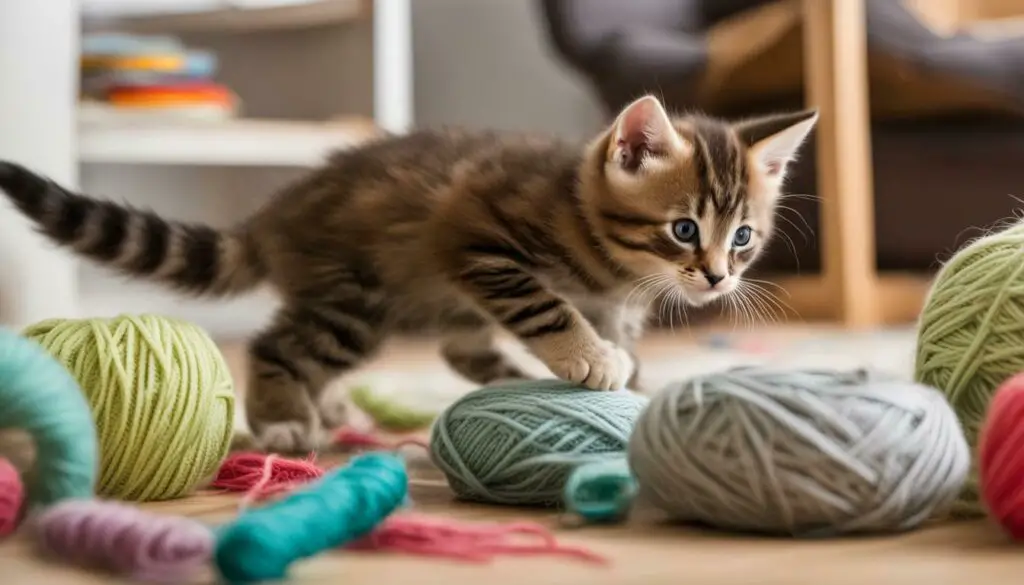
Conclusion
By following this new kitten checklist and having all the necessary items ready, you can provide a comfortable and safe environment for your new furry friend. Bringing a new kitten home is an exciting but challenging task, and being prepared is key to ensuring a smooth transition.
Start by kitten-proofing your home, ensuring that there are no potential dangers or hazards. Secure windows, remove fall risks, pick up cords, and make houseplants and bouquets inaccessible. Keep food and medications locked away to prevent accidental ingestion.
Next, gather the essential supplies for your new kitten. This includes high-quality kitten food, food and water bowls, a litter box, toys, scratching surfaces, and a carrier for transportation and vet visits. These items will help meet your kitten’s basic needs, promote their well-being, and keep them entertained and mentally stimulated.
Don’t forget to schedule a vet visit for your new kitten. This is crucial for their overall health and well-being. During the visit, your vet will provide vaccinations, test for transmissible diseases, and start parasite prevention. Microchipping your kitten is also important for identification and safe return in case they ever get lost.
Lastly, investing in quality cat products and finding a trusted vet are essential for your new kitten’s long-term care. High-quality products will ensure their comfort and safety, while a trusted vet will provide the best medical care and guidance for your furry friend.
Remember, by following this new kitten checklist and providing the necessary items, you are setting the stage for a happy and healthy life together with your new kitten. Enjoy the journey and create cherished memories!
FAQ
What essential items do I need for a new kitten?
The essential items you need for a new kitten include kitten food, food and water bowls, a litter box, toys, scratching surfaces, a carrier, and items to kitten-proof your home.
How do I kitten-proof my home?
To kitten-proof your home, secure windows, remove fall risks, pick up cords, make houseplants and bouquets inaccessible, and keep food and medications locked away.
How do I choose the right kitten food and water bowls?
When choosing kitten food and water bowls, opt for shallow dishes that are easy for your kitten to access. Avoid using plastic bowls and opt for stainless steel or ceramic instead.
How do I set up a comfortable sleeping area for my new kitten?
To create a comfortable sleeping area for your new kitten, provide a cozy bed or blanket in a quiet and safe corner of your home.
How important is a proper litter box for my new kitten?
A proper litter box is crucial for your new kitten’s hygiene and litter training. Choose a litter box that is large enough for your kitten, and place it in a quiet and accessible location.
Why are toys and entertainment important for my new kitten?
Toys and entertainment are important for your new kitten’s mental stimulation and to prevent boredom. Provide a variety of toys such as interactive toys, balls, and scratching posts.
How do I protect my furniture with scratching surfaces?
To protect your furniture, provide appropriate scratching surfaces such as scratching posts or boards. Place these near your kitten’s favorite furniture and encourage them to use them instead.
What type of carrier do I need for my kitten?
It’s important to have a suitable carrier for your kitten to ensure safe transportation and vet visits. Choose a carrier that is sturdy, well-ventilated, and easy to clean.
Why should I schedule a vet visit for my new kitten?
Scheduling a vet visit is important to ensure your new kitten receives necessary vaccinations, check-ups, and preventative care to maintain their health and well-being.
Why should I consider microchipping and identification for my kitten?
Microchipping your kitten provides a permanent form of identification and increases their chances of being returned to you if they get lost. It’s a simple and safe procedure that can offer peace of mind.
Are vaccinations and disease testing important for my new kitten?
Yes, vaccinations and disease testing are essential to protect your new kitten from common and potentially dangerous illnesses. Consult with your vet to determine the appropriate vaccinations and tests for your kitten.
How do I prevent parasites in my new kitten?
Starting parasite prevention for your new kitten is vital to their health. Speak to your vet about appropriate flea, tick, and heartworm preventatives, as well as regular deworming treatments.
Why should I invest in quality cat products for my kitten?
Investing in high-quality cat products ensures your kitten’s comfort, safety, and durability. This includes items such as food, litter, carriers, toys, and scratching surfaces.
How do I find a trusted vet for my kitten?
Finding a trusted veterinarian is important for your kitten’s ongoing care. Ask for recommendations from friends or family, research local vets online, and schedule a meet-and-greet appointment to assess their compatibility with your kitten.
How do I kitten-proof my home?
To create a safe environment for your curious new companion, secure windows, remove fall risks, pick up cords, make houseplants and bouquets inaccessible, and keep food and medications locked away.

